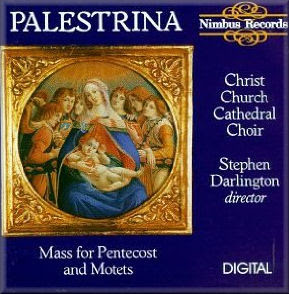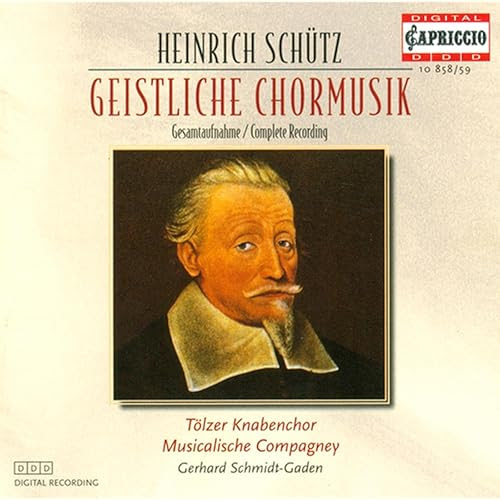Program: #94-19 Air Date: May 09, 1994
NOTE: Frequent guest commentator Fr. Jerome Weber of Fanfare Magazine joins us to discuss music for the Feast of the Pentecost.
This program is Free for all, thanks to this generous Preservation Grant:
I and VII. Chefs-d’oeuvres Gregoriens (Monks of the Abbey of St. Martin of Ligugé). SM
—Venis Creator Spiritus
—Pentecostal chant
II. Missa In Festo Pentecostes (Whit-Sunday Mass) (Nuns-Choir Of The Benedictine Abbey Of Our Lady Of Varensell,Pater Aurelian Weiss, OSB). Archiv LP 198.303
:format(jpeg):mode_rgb():quality(40)/discogs-images/R-11834557-1523183911-7387.jpeg.jpg)
|
A1 |
Introitus: Spiritus Domini |
|
A2 |
Kyrie III |
|
A3 |
Gloria III |
|
A4 |
Oratio: Deus, Qui Hodierna Die |
|
A5 |
Lectio: Cum Complerentur Dies Pentecostes |
|
A6 |
Alleluia: Emitte Spiritum Tuum |
|
A7 |
Alleluia: Veni, Sancte Spiritus, Sequentia: Veni Sancte Spiritus |
|
A8 |
Lesson Sancti Evangelii: Si Quis Diligit Me |
|
A9 |
Credo V |
|
B1 |
Offertorium: Confirma Hoc, Deus |
|
B2 |
Oratio Super Oblata: Munera, Quaesumus Domine |
|
B3 |
Praefatio Ad Pentecostes: V.D. Qui, Ascendens Super Omnes Caelos |
|
B4 |
Sanctus III |
|
B5 |
Doxologia: Per Quem Haec Omnia / Per Ipsum |
|
B6 |
Pater Noster |
|
B7 |
Pax Domini |
|
B8 |
Agnus Dei III |
|
B9 |
Communio: Factus Est Repente |
|
B10 |
Postcommunio: Sancti Spiritus, Domine |
III. Palestrina: Music for Pentecost (Christ Church Cathedral Choir/Stephen Darlington). Nimbus CD Ni 5100.

From Music Web International: What sort of sound did Palestrina's choir make, when they gave the first performance of Palestrina's Missa Dum complerentur? We don't know. We can't even be sure whether the top line was sung by falsettists, castrati, boys or a combination of all three - not women, of course, that is certain given the church's attitude. What is probably true is that Palestrina's choir didn't sound anything like Christ Church Cathedral choir under Stephen Darlington. This recording was made in 1987, one of the first they made after Stephen Darlington took over from Francis Grier in 1985.
The choir's sound is the epitome of the English cathedral sound, with lovely clear, transparent trebles. There is no hint of the continental sound of Westminster Cathedral. This is neither a good thing nor a bad one, simply a style preference. And when the English cathedral sound is done well as it is here, then it is very seductive. The male altos blend very well with the trebles. But there is the feeling, inevitable in most cathedral choirs, that the men singing the lower parts are not quite the equals of the professional chamber choirs who have made the repertoire their own. Then again, if you look at the choir roster, there are number of names such as Andrew Carwood and Edward Wickham, who have gone on to greater things.
Christ Church Cathedral Choir sing this repertoire on a regular basis in a liturgical context. And this helps bring a naturalness and directness to the performance. You don't get the sort of highly controlled, well modulated performance that a group like, say, the Tallis Scholars would give. And in fact, Nimbus engineers have given the recording some distance, but everything remains clear.
Palestrina's Missa Dum complerentur is a relatively gentle work which responds to Stephen Darlington's relaxed approach, with flexible tempi and a nice feeling for the structure of the piece.
The performance couldn't be anything but English, but it is done with such artistry and naturalness that I was very taken with the result. If you feel you need a more continental approach then Martin Baker and Westminster Cathedral Choir recorded the mass in 2003. The Westminster boys still preserve their famous continental sound. So you have a choice.
Christ Church pair the mass with a lovely sequence of motets. They are all quite well known, but they are a varied and well judged selection. I could imagine a more intense performance of Super flumina Babylonis, but it is nicely balanced and contrasts well with the brighter Exsultate Deo and Sicut Cervus. The sequence finishes with the motet on which Palestrina based the mass.
The CD booklet includes an excellent article by John Milsom and full texts.
This might not be everybody's ideal performance of Palestrina's mass, but it is a perfect example of the English Cathedral sound and beautifully performed.
Missa Dum complerentur [33.40]
Super flumina Babylonis [4.32]
Exsultate Deo [2.32]
Sicut cervus [3.23]
O Bone Jesu, exaudi me [3.43]
Dum complerentur dies pentecostes [6.41]
IV. Victoria: Geistliche Chorwerke (Regensburg Domchor/Hans Schrems). Archiv 4777090.

Missa 'Vidi Speciosam’
Motet 'Vidi Speciosam’
Responsorium IV
Motet 'O Domine Jesu Christe’
Responsorium IV
Responsorium VI
Lectio III
Responsorium IX
Motet 'Dum Complerentur’
Motet 'Surrexit Pastor Bonus
V. Thomas Tallis: Spem in alium (Tallis Scholars/Peter Philips). Gimell CD 006
From Music Web International: The higher key gives a more penetrating quality to the singing and the top line sung by Tessa Bonner is especially striking. This is steady, controlled singing of great purity and precision the refined, ethereal sound is deliberately non-interventionist. This has been a top, benchmark recommendation since its release 32 years ago but for those who want more dynamic variety and emotional investment, it is toocool and even dispassionate. Balances and the stereo spread are excellent. I love its patrician sparseness but suspect that this music has more to give than the Tallis Scholars concede.
- Spem in Alium
- Sancte Deus
- Salvator Mundi, Salva Nos 1
- Salvator Mundi, Salva Nos 2
- Gaude Gloriosa
- Miserere Nostri
- Loquebantur Variis Linguis
VI. Heinrich Schütz: Geistliche Chormusik (Tölzer Knabenchor/Musicalische Compagney/Gerhard Schmidt-Gaden). Capriccio CD 10.858/59.

1. ![]() Es wird das Scepter von Juda nicht entwendet werden, SWV 369 00:02:41
Es wird das Scepter von Juda nicht entwendet werden, SWV 369 00:02:41
2. ![]() Er wird sein Kleid in Wein waschen, SWV 370 00:02:15
Er wird sein Kleid in Wein waschen, SWV 370 00:02:15
3. ![]() Es ist erschienen die heilsame Gnade Gottes, SWV 371 00:03:55
Es ist erschienen die heilsame Gnade Gottes, SWV 371 00:03:55
4. ![]() Verleih uns Frieden genadiglich, SWV 372 00:02:17
Verleih uns Frieden genadiglich, SWV 372 00:02:17
5. ![]() Gib unsern Fursten und aller Obrigkeit Fried und gut Regiment, SWV 373 00:02:05
Gib unsern Fursten und aller Obrigkeit Fried und gut Regiment, SWV 373 00:02:05
6. ![]() Unser keiner lebet ihm selber, SWV 374 00:03:26
Unser keiner lebet ihm selber, SWV 374 00:03:26
7. ![]() Viel werden kommen von Morgen und von Abend, SWV 375 00:02:25
Viel werden kommen von Morgen und von Abend, SWV 375 00:02:25
8. ![]() Sammlet zuvor das Unkraut, SWV 376 00:01:44
Sammlet zuvor das Unkraut, SWV 376 00:01:44
9. ![]() Herr, auf dich traue ich, SWV 377 00:03:04
Herr, auf dich traue ich, SWV 377 00:03:04
10. ![]() Die mit Tranen saen, SWV 378 00:03:34
Die mit Tranen saen, SWV 378 00:03:34
11. ![]() So fahr ich hin zu Jesu Christ, SWV 379 00:02:58
So fahr ich hin zu Jesu Christ, SWV 379 00:02:58
12. ![]() Aria: Also hat Gott die Welt geliebt, SWV 380 00:02:51
Aria: Also hat Gott die Welt geliebt, SWV 380 00:02:51
13. ![]() O lieber Herre Gott, wecke uns auf, SWV 381 00:03:32
O lieber Herre Gott, wecke uns auf, SWV 381 00:03:32
14. ![]() Trostet, trostet mein Volk, SWV 382 00:03:34
Trostet, trostet mein Volk, SWV 382 00:03:34
15. ![]() Ich bin eine rufende Stimme, SWV 383 00:04:10
Ich bin eine rufende Stimme, SWV 383 00:04:10
16. ![]() Ein Kind ist uns geboren, SWV 384 00:03:56
Ein Kind ist uns geboren, SWV 384 00:03:56
17. ![]() Das Wort ward Fleisch, SWV 385 00:03:56
Das Wort ward Fleisch, SWV 385 00:03:56
Disc 2
Schütz, Heinrich
Albrecht von Preussen / Bible / Walter, Johann / Luther, Martin / Schalling, Martin / Albrecht von Preussen / Bible / Walter, Johann / Luther, Martin / Schalling, Martin, lyricist(s)
Geistliche Chormusik, Op. 11, SWV 369-397
1. ![]() Die Himmel erzahlen die Ehre Gottes, SWV 386 00:04:55
Die Himmel erzahlen die Ehre Gottes, SWV 386 00:04:55
2. ![]() Herzlich lieb hab ich dich, o Herr, SWV 387 00:09:21
Herzlich lieb hab ich dich, o Herr, SWV 387 00:09:21
3. ![]() Das ist je gewisslich wahr und ein teuer wertes Wort, SWV 388 00:04:57
Das ist je gewisslich wahr und ein teuer wertes Wort, SWV 388 00:04:57
4. ![]() Ich bin ein rechter Weinstock, SWV 389 00:03:21
Ich bin ein rechter Weinstock, SWV 389 00:03:21
5. ![]() Unser Wandel ist im Himmel, SWV 390 00:03:44
Unser Wandel ist im Himmel, SWV 390 00:03:44
6. ![]() Selig sind die Toten, die in dem Herren sterben, SWV 391 00:03:38
Selig sind die Toten, die in dem Herren sterben, SWV 391 00:03:38
7. ![]() Was mein Gott will, das g'scheh allzeit, SWV 392 00:03:35
Was mein Gott will, das g'scheh allzeit, SWV 392 00:03:35
8. ![]() Ich weiss, dass main Erloser lebt, SWV 393 00:02:49
Ich weiss, dass main Erloser lebt, SWV 393 00:02:49
9. ![]() Sehet an den Geigenbaum und alle Baume, SWV 394 00:04:16
Sehet an den Geigenbaum und alle Baume, SWV 394 00:04:16
10. ![]() Der Engel sprach zu den Hirten, SWV 395 00:02:39
Der Engel sprach zu den Hirten, SWV 395 00:02:39
11. ![]() Auf dem Gebirge hat ein Geschrei gehort, SWV 396 00:04:31
Auf dem Gebirge hat ein Geschrei gehort, SWV 396 00:04:31
12. ![]() Du Schalksknecht, alle diese Schuld habe ich dir erlassen, SWV 397 00:03:15
Du Schalksknecht, alle diese Schuld habe ich dir erlassen, SWV 397 00:03:15
Composer Info
Giovanni Pierluigi da Palestrina, Thomas Luis de Victoria, Thomas Tallis, Heinrich Schütz (1585 - 1672), JOHANN WALTER (1496 - 1570), MARTIN LUTHER (1483 - 1546), MARTIN SCHALLING (1532 - 1608), ALBRECHT VON PREUSSEN (1490 - 1568)
CD Info
Archiv LP 198.303, Nimbus CD Ni 5100, Archiv 4777090, Gimell CD 006, Capriccio CD 10.858/59